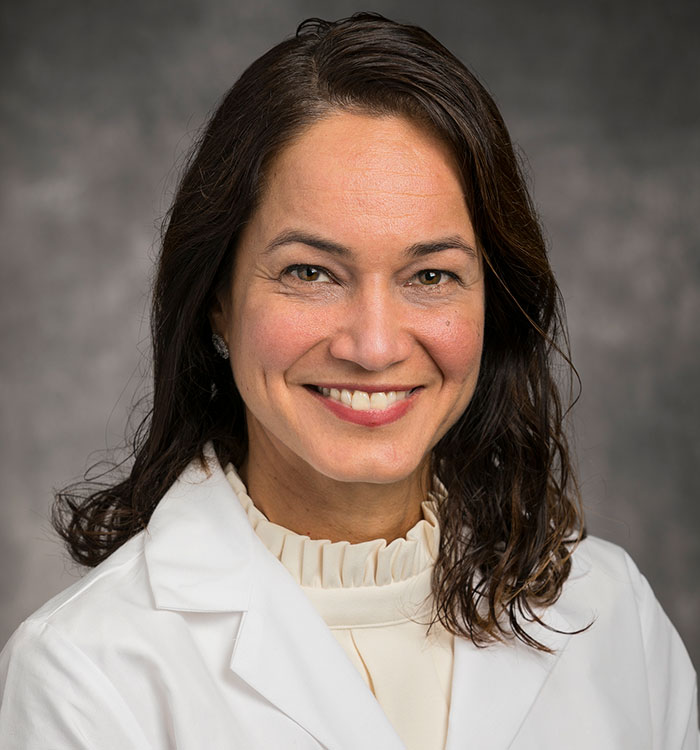“Exploding” Number of New Therapies Now Available for Lung Cancer, UH Expert Says
June 23, 2019
New thoracic oncology specialist at UH sits on prestigious National Comprehensive Cancer Network guideline committee
UH Clinical Update | June 2019
Molecular targeted therapies have revolutionized the treatment of lung cancer in recent years. As a new member of the thoracic oncology team at UH Seidman Cancer Center, medical oncologist Debora Bruno, MD, MS, is bringing her considerable expertise with these therapies to bear for UH patients.
 Debora Bruno, MD, MS
Debora Bruno, MD, MS“Lung cancer is becoming a very sub-specialized area,” she says. “We have an exploding number of new therapies that involve targeting molecular aberrations in lung cancer. At UH Seidman, we are doing reflexive testing in all the patients we see with locally advanced and stage 4 lung cancer, making sure that we have knowledge of all the potential actionable molecular targets that cancer has and going after those targets.”
Unlike some other cancer centers, the team at UH Seidman also tests tumors for mutations that don’t yet have a FDA-approved molecular targeted therapy, Dr. Bruno says.
“We don’t just test for the mutations that we know have FDA-approved drugs already available,” she says. “We do what we call focused next-generation sequencing, so we test for other mutations, too. This allows us to have results that allow patients to enter clinical trials for drugs that are in development for different potential molecular targets. Many centers don’t do this – they test basically for the mutations that are already ‘druggable,’ as we say.”
Dr. Bruno earned her medical degree at Federal University of Ceara in Brazil and completed her internal medicine training at Albert Einstein Medical Center in Philadelphia. This was followed by a fellowship in hematology and medical oncology at Thomas Jefferson University Hospital, also in Philadelphia. After working in rural Nebraska for three years, where she was able to help establish a multidisciplinary clinic for thoracic oncology patients, she went on to pursue a master’s degree in cancer biology at the Graduate School for Biomedical Sciences at University of Houston/MD Anderson Cancer Center. Before recently joining the thoracic oncology team at UH Seidman, Dr. Bruno spent four years on the medical staff at MetroHealth, where she expanded the number of clinical trials for lung cancer patients and led the multidisciplinary thoracic team. Now at UH, she sees patients at UH Seidman Cancer Center main campus and UH Minoff Health Center at Chagrin Highlands.
Dr. Bruno is a member of the National Comprehensive Cancer Network’s thoracic oncology guidelines committee. As such, she helps advise her colleagues nationwide on the latest research findings and how to use targeted therapies in the most effective way possible.
Although there are many new therapies, she highlights three as particularly important for lung cancer.
“In the EGFR mutation world, we now have a third-generation tyrosine kinase inhibitor called osimertinib (Tagrisso),” Dr. Bruno says. “It’s superior to other EGFR tyrosine kinase inhibitors we had in the past. It has great CNS penetration and it really improves the amount of time patients taking the medication have without progression of their disease, not only systemically but also in the brain. For the ALK-arranged lung cancers, we have a medication called alectinib (Alecensa). It also has good brain penetration and controls CNS metastases very well with minimal side effects. In the immunotherapy world, we’re currently using a medication called pembrolizumab (Keytruda), which targets a protein in T cells and allows for these T cells to become super-active against malignancies. It can be used either alone or in combination with chemotherapy to improve response rates and overall survival. This year at ASCO, data was presented showing that patients with stage 4 lung cancer treated with pembrolizumab alone who had high PD-L1 expression, close to 30 percent of them were alive at five years.”
As important as these and other therapies are in improving outcomes for patients with thoracic cancers, equally important, Dr. Bruno says, is establishing a respectful and easy rapport with her patients.
“Even though the information is all in the chart, there’s nothing like listening to the patient first,” she says. “The patient and family members can talk about their perceptions of how the sickness started, how they’re coping, their understanding of what’s going on and their goals and issues. That’s the number one approach from my standpoint to interact with the patient and the family, listening first. Also, when I talk with the patient and the family to explain things, sometimes I even draw. It’s such a foreign world for most of them and difficult to grasp. I usually say that my job here is as a translator and advisor, trying to explain to you what’s going on and at the end, advise you on the best course of action.”
For more information about Dr. Bruno or to make a referral, please call 216-844-3951.
Tags: Lung Cancer, Novel Therapies


